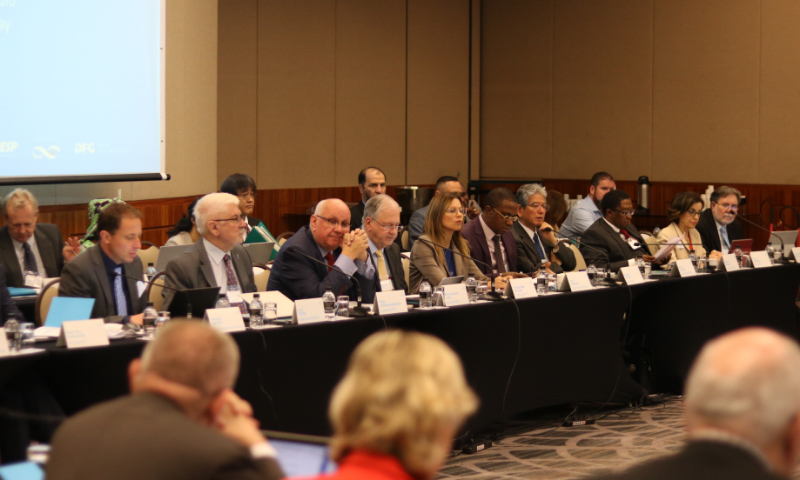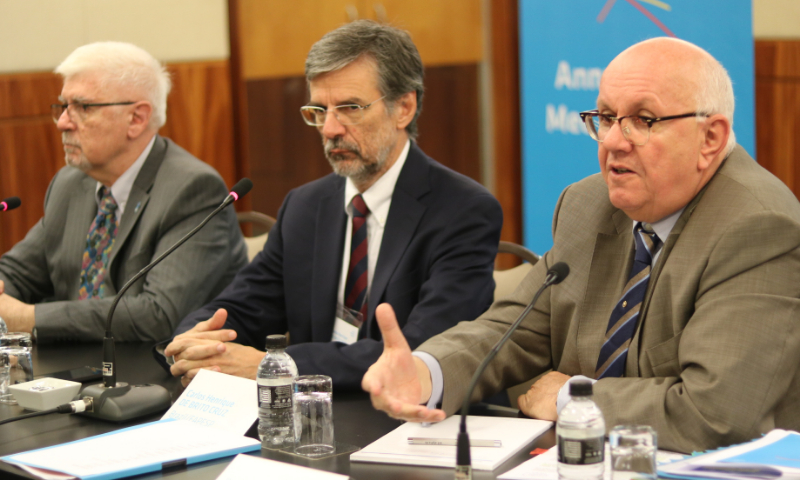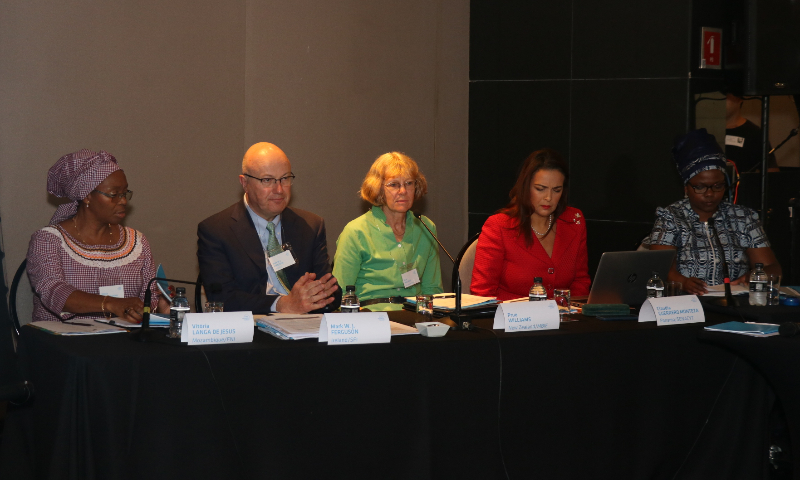Annual Meeting of the Global Research Council in São Paulo
(27.05.19) DFG President Prof. Dr. Peter Strohschneider was in São Paulo from 1 to 3 March to attend the annual meeting of the Global Research Council (GRC). Representatives of 49 research funding organisations from 45 countries attended the event that took place for the first time in South America and was jointly organised by the funding institutions DFG, FAPESP (São Paulo, Brazil) and CONICET (Argentina).

Representatives of the 49 participating funding organisations of the GRC meeting in São Paulo
© Felipe Maeda/ Agência FAPESP
This year's central theme involved dealing with the rising expectations of governments and bodies managing public funds regarding the economic and societal benefits of the research that they finance.
This trend implies challenges for funding organisations all over the world. Firstly, this includes gauging the potential societal or economic benefits of a research project in advance without knowing the future fields of application or societal requirements. However, some governments demand this as a review criterion for funding decisions, which is particularly problematic for knowledge-driven research that is not directly geared towards application.
Secondly, research institutions are faced with the difficulty of determining and assessing the societal and economic benefits of funded projects after they have been completed.
The period between the end of the project and the assessment of the benefits is particularly problematic for Jorge Tezon, Director of Scientific and Technological Development of the Argentinian funding institution CONICET: "In a small number of cases this is clear straight away, but it often takes several years."
"Or even decades," added Prof. Dr. Strohschneider. "Take the theory of relativity as an example, its benefits only became clear after 80 years when GPS technology was being developed."

Jorge Tezon (CONICET), Carlos Henrique de Brito Cruz (FAPESP) and Peter Strohschneider (DFG) at a press conference in São Paulo
© Felipe Maeda/ Agência FAPESP
In the view of the DFG President, the debate surrounding the benefits of scientific research is shaped by a series of misconceptions. This includes the idea that the main purpose of research is to find specific solutions to current issues in a short period of time. According to Strohschneider, however, this is only one aspect of modern research systems and should not be generally applied to all areas of research. "The main function of modern research is to generate new methods and knowledge that not only serve contemporary society but also have the potential to bring about solutions to future and unknown problems," he said.
According to Prof. Dr. Carlos Henrique Brito, Scientific Director of FAPESP, the expectation that research can generate cutting-edge knowledge and immediate solutions out of thin air is another misconception: "Today, it is not possible for us to find solutions to problems without centuries-old knowledge accumulated over generations. This is why both research and the respective results take time, which in turn means that expectations regarding short-term solutions cannot be met."
Another area of difficulty according to Tezon is the assumption that research can offer the only certain answer to current issues. "The public needs to have a better grasp of the complexity and interdisciplinarity of the challenges. There are no universal solutions to problems such as unemployment and drug addiction," he explained.
In view of the above, the DFG President spoke in favour of taking a methodical rather than an ideological approach in the debate surrounding the benefits of research: "No researcher wants to generate useless knowledge; rather, it is essential to discuss how existing costly research funding systems can be made accessible and justified to the public. In turn, this raises methodological questions: "How do we demonstrate, communicate and categorise the benefits and how can these considerations be integrated into political decision-making processes?" said Strohschneider.
Besides this issue, other matters relating to research were also touched upon during the GRC meeting, such as gender equality in research, open science, efforts to establish universal access to scientific publications and sustainable development.

Gathering of the working group on gender equality at the GRC meeting
© Felipe Maeda/ Agência FAPESP
The organisations participating in the GRC addressed these issues over the past year at regional meetings. They prepared the policy paper "GRC 2019 Statement of Principles" on the impact of scientific research. The document adopted during the annual meeting in São Paulo calls for a balance between knowledge-driven and applied research and for the preservation of scientific quality as an overriding criterion in the selection of projects to be financed. Moreover, there ought to be an adequate degree of flexibility in the assessment of the societal and economic benefits. The paper, which serves as a guide for funding institutions, also recommends that effective science communication measures are taken.
The Global Research Council was founded in 2012 to strengthen international cooperation in research and between research funding organisations, which also includes an active exchange of data and best practices. As an active member, the DFG holds key positions on the Governing Board, in the Executive Support Group, on the Programme Committee and the working group on gender equality. Representatives of the Division for International Affairs also regularly attend the preparatory regional meetings.
Prof. Dr. Brito, Scientific Director at the FAPESP, was elected Chair of the GRC Governing Board at the annual meeting in São Paulo.